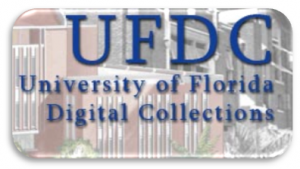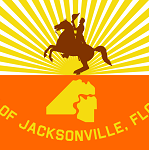Spring 2015 interns produced podcasts on a variety of topics. Image from Jacksonville, Florida Wikipedia article.
University of Florida Digital Collections Archive
 To date, 90+ oral history podcasts are available on the University of Florida’s Digital Collections website, including final projects for internship classes, as well as the Summer 2013 seminar and original SPOHP podcast series, released in 2009. Browse the following highlights for more information, and visit the UFDC to download the many available series.
To date, 90+ oral history podcasts are available on the University of Florida’s Digital Collections website, including final projects for internship classes, as well as the Summer 2013 seminar and original SPOHP podcast series, released in 2009. Browse the following highlights for more information, and visit the UFDC to download the many available series.
To access information about individual podcasts, scroll through the UFDC collection. Podcasts below are from the Spring 2015 internship class. All podcasts are 15 minutes or less to facilitate easy access to local history for students, teachers, and the general public.
David Barsamian: Community Action and Radio (created by Virginia Hamrick) 03:53
David Barsamian (COA-025) created Alternative Radio to cover important stories neglected by mainstream media. In this podcast, he explains why he first pursued broadcasting, and how journalism can continue to be a source of social change. Topics include Alternative Radio, broadcasting, Armenian genocide, and using journalism to hold the government accountable.
Medea Benjamin: Police and Protests (created by Virginia Hamrick) 06:31
Activist and founder of grass roots organization Cope Pink, Meada Benjamin (WAF-024) explores the effects of police brutality on community organizing. Topics include: organizing and protesting, police relations, and the importance of citizen movements.
The Woolly Worm Festival of Banner Elk, North Carolina (created by Austyn Szempruch) 03:58
Roy Krege (ACP-027), also known as Mr. Woolly Worm, details how Banner Elk’s Woolly Worm Festival was started nearly 38 years ago. Roy Krege explains his role of announcing the festivities, held annually on the third weekend of October. He goes on to discuss the importance of the Woolly Worm Festival and how it has grown into a national festival with international recognition.
Not an Addict (created by Briana Whalin) 06:23
Briana Whalin sheds light on Jennifer Smith’s (ADHP-004) escape from addiction, from alcohol consumption at a young age to prostitution and crack cocaine. Today, after discovering her Christian faith and running her own recovery service, Smith teaches women with substance abuse problems that though the road to recovery is long, they are not defined by their addictions.
A Life in Drug Research (created by James Wales)
In this podcast, Linda Cottler (ADHP-008) discusses her research in classification of substance abuse around the world. After a successful career at Washington University at St. Louis spanning three decades, drug researcher Linda Cottler joined the University of Florida. In her words, her work gives “vulnerable populations…a voice in research” and aids the development of the recovery industry.
Drug Court’s Alternative Sentencing (created by Annemarie Nichols) 04:57
Duval County probation officer Sue Dolinsky (ADHP-002) explores the difference between traditional drug sentencing methods and the alternative rehabilitation provided by the drug court system. Topics include: Drugs addicts, alternative drug sentencing practices, rehabilitation, the judicial and criminal justice system, and drug courts.
Historian of Drugs (created by Katie Gresham) 07:00
Dr. Joseph Spillane (ADHP-003) is a drug historian at the University of Florida. He has witnessed and taken part in the many changes that have occurred during his time in the field. Topics include: growth of the field, changes in methodology, addiction theory, history of drugs, cocaine, work with other historians, and oral history.
Addiction Starts in All Forms (created by Zubin Kapadia) 05:49
This podcast challenges the common stereotype of rough childhoods as portrayed by mass media. Rather, this podcast details the life of a former addict, Amy Crisp (ADHP-001), before and during the manifestation of their addiction.
The Gypsy Method (created by Jes Baldeweg-Rau) 06:23
This podcast delves into the musical mind of Alachua County Youth Orchestra alum Stewart Kitts (ACYO-012) as he describes how the influences of Gypsy culture major musical influences his grandfather provided him and how he applies those same lessons to his students today. He gives the listener a sample performance on his violin.
Addictive Personalities (created by Virginia Hamrick) 05:01
In this podcast, Judy Lepoma (ADHP-009) reflects on her addictive personality, and how it led to both her addiction and her sobriety from drugs. Topics includes: addictive personality, cocaine, narcotics, sobriety.
Music is Everywhere (created by Virginia Hamrick) 04:34
Aaron Colvorson (ACYO-007) played in the Alachua County Youth Orchestra in high school. Since then, he has studied music around the world, most recently in Kenya. In this podcast, he explains how studying a range of musical styles can increase cultural awareness.
Erika Clarke and House of Hope (created by Mikey Bennett) 06:01
Erika Clarke (ADHP-011) is a recovering addict and current member of Gainesville’s House for Hope sobriety program for women. In this podcast, she talks about her drug-related experiences and how she was able to end her addiction through involvement with the program.
School Segregation in Mathews and Middlesex Counties (created by Jennifer Thelusma) 06:46
Frances Lowe (TMP-069) and Raymond Owens (TMP-059) were born in Middlesex and Mathews Counties, respectively, in the 1930s. This podcast compares the experiences of Raymond Owens, a white man, and Frances Lowe, a black woman, with segregated public schools.
For more information about the podcast series, University of Florida Digital Collections, and more, please contact the Samuel Proctor Oral History Program.
